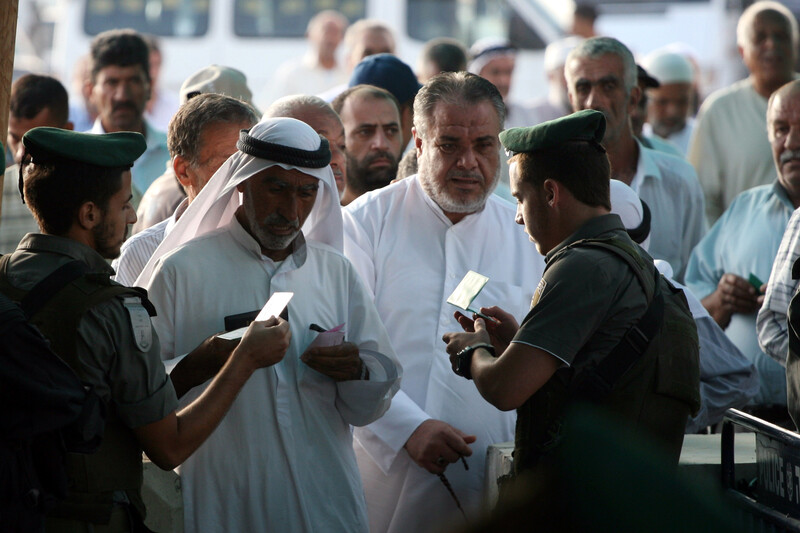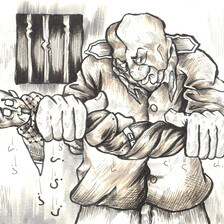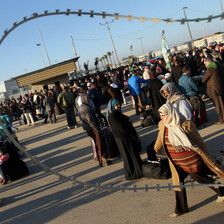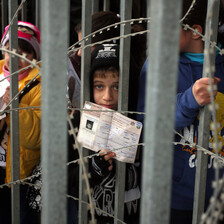The Electronic Intifada Ramallah 2 October 2013

Israel’s permit regime places severe restrictions on Palestinians’ freedom of movement.
APA images“I no longer recognize Jerusalem anymore, the one I lived in before,” said Suheir Azzouni, a Palestinian Jerusalemite who has split the last decade between her native city and France.
“It’s really shocking and very alienating, but at the same time, this is our homeland,” Azzouni told The Electronic Intifada in a telephone interview. “I’ve noticed how the families [in Jerusalem] are fragmented, [Israel’s] separation wall has kept some inside and some outside of the city, and how difficult it is for kids to go to one school or the other.
“They have created a hell for us.”
Azzouni and her family moved to France twelve years ago after her husband, Khalil Mahshi, landed a job as a director of a program in the United Nations agency UNESCO. Her husband went by himself initially, but taking into account her children’s education, Azzouni and the three children followed him eight months later.
Since the move, Azzouni has made numerous temporary returns to Jerusalem, once for a period of ten months. “It’s not possible to keep two houses,” Azzouni explained. “We’re not millionaires.”
Stateless
Despite the fact that the UN has repeatedly confirmed that East Jerusalem is illegally occupied by Israel, Palestinian Jerusalemites hold a special Israeli-issued blue residency card and are considered stateless under international law. Most Palestinian Jerusalemites are, however, entitled to a Jordanian passport.
During the family’s most recent visit this past July, Azzouni’s husband and their two daughters went to the Israeli interior ministry to renew travel documents.
“After learning that [my husband] had a French passport, the director of the office of the Ministry of Interior revoked the IDs of everyone, including myself, who wasn’t present, and my son who was in France,” she said.
In the case of the Mahshi family, the ministry cited Israel’s “Center of Life” policy, which places on Palestinian Jerusalemites the burden of proving beyond a doubt that Jerusalem is their place of both residence and work.
Jewish Israelis, who often move to Jerusalem from countries across the world, do not face the same requirements.
“As normal human beings, we should be able to go travel and live and work abroad and return to our homeland,” Azzouni said.
This latest instance is not the first time that the Mahshi family has faced problems from the Israeli authorities since they moved. Coming back and forth between France and Palestine over the years, Azzouni said that they have faced constant harassment and had to hire lawyers several times to prove that they are UN employees and do not hold a second nationality.
Yet problems escalated after her husband was awarded French nationality upon receiving a medal “for his work on education in Palestine,” said Azzouni. Israeli authorities justified revoking all five of their IDs by arguing that the entire family was eligible for French nationality.
Only one of their two daughters, however, was granted French citizenship because she was under eighteen years old. The rest are living in France with a residence status “that is not automatically renewable and is not permanent residence,” she said, adding that it expires every ten years.
“Fragmentation of family”
Azzouni is not eligible for French citizenship because her husband was not a French national when they married. “The other two children, who are now stateless, are not qualified,” she explained. The latter two were over 18 years old when their father was granted French citizenship.
“This is the fragmentation of the family,” Azzouni said. “Two are now French citizens, I am Jordanian — and as a Palestinian, not eligible to get Jordanian citizenship for the rest of the family — and two are completely stateless.”
Though the Mahshi family has decided to challenge the revocation of their IDs in Israeli courts, Azzouni said that she felt hopeless.
“No, I don’t have any [hope] because their laws are discriminatory…This Center of Life policy is just to push us out of our homeland,” she said.
Since July, Azzouni has repeatedly attempted to get her story into the mainstream US media, including The Huffington Post and The New York Times. However, none responded to her messages.
“You feel like the whole world is conspiring against you and they won’t even let you express your pain,” she said. “We were hoping to go back and retire in our homeland and to be able to grow old in our country with our friends.”
Yet if the Israeli court upholds the revocation, their only option is “to hope that the French do not kick us out.”
An online petition in support of the Mahshi family has already received more than 1,200 signatures.
Constant state of limbo
Professor Kamel Hawwash, a British citizen of Palestinian origin and vice-chairperson of the Palestine Solidarity Campaign in the UK, told The Electronic Intifada that the Center of Life policy affects every aspect of how Palestinian Jerusalemites lead their lives.
Hawwash’s wife, who has a Jerusalem ID, returns to Palestine each year to demonstrate her immediate connection to the city for fear of having her ID revoked. When the couple decided to have a child a couple years ago, they were confronted with the concern about which citizenship to seek for the child.
The Israeli authorities refused to grant their son a Jerusalem ID. “They said the only way we can add him is if the family lives two consecutive years [in the city],” Hawwash said.
Hawwash described a constant state of limbo for Palestinians in Jerusalem. His wife always has to worry about having her ID taken away, which would also separate her and their 20-month-old son from her entire family.
In the meantime, whenever they travel back to visit, the small child has to enter on tourist visas that last three months and are often denied to Palestinians. Additionally, it is unclear if Hawwash’s wife will be eligible for a passport issued by the Palestinian Authority in the case that her Jerusalem ID is revoked.
“It makes it so that Palestinians cannot plan a life, but Israeli Jews can,” Hawwash commented. “Is it not about trying to ensure that Jerusalem is depopulated of Palestinians or that their numbers are controlled?
“The West talks about the importance of Israel’s security, but fails to mention the insecurity of Palestinians. This is the issue of the insecurity they feel as individuals and its impact on their daily lives.”
“Israeli citizens are free to leave the state for an extended period of time — and hold dual nationality — without fear of having their right to return and live in their place of birth revoked,” Rima Awwad of the Jerusalemites Campaign told The Electronic Intifada.
Noting that Israel encourages Jews across the world to immigrate and take Israeli citizenship, Awwad said, “the Center of Life policy institutionalizes an entitlement system to live in the occupied land based purely on Israel’s ethno-religious order.”
Between 1967 and 2012, Israel revoked the residency of more than 14,000 Palestinian Jerusalemites, according to the Israeli human rights organization B’Tselem.
Awwad said that Israeli policy in East Jerusalem punishes Palestinians with “home demolitions, municipal discrimination, an elevated poverty rate, massive unemployment, severe building permit limitations and settlement expansions — to such a degree that Palestinians are all but forced to leave. Once they do, the Center of Life policy is used to ensure that they won’t be able to return.”
Thus, the Center of Life policy is just one among an array of laws designed to entrench Jewish settlement and push Palestinians out of the city.
“We are undergoing a silent transfer,” said Suheir Azzouni. “And this is illegal.”
Patrick O. Strickland is an independent journalist. His articles have appeared at Al Jazeera English, Truthout and The Electronic Intifada. Follow him on Twitter: @P_Strickland_.





